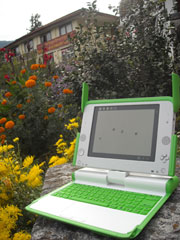Recently the International Telecommunication Union (ITU) and OLPC donated 220 XO laptop computers to Bhutan for 20 community schools. These XO's will be part of a pilot program to see if the Bhutanese Department of Information and Technology should buy more. Yet Kuensel Online brings up an issue:
[A] major aspect of the XO laptop that may be underutilised in Bhutan is that most of the community schools, which will receive the computers, lack internet access. Since all the computers have wireless internet capability as part of its goal to create access to the world's information for the children that use it, this major option will not be available for another two years, said Bhim Suberi.
Now lets ask the larger question: Is the XO laptop a complete learning experience without Internet connectivity? Back with the boys from Bhutan, we hear that the XO laptop works just fine without Internet access:
[S]tudents will still be able to create local networks and exchange their information with each other, said Sonam Dukda, which would still make the experience entertaining for the students using it.
While that is a great sound-bite, do you think it is accurate? I have three XO laptops now, and its fun to use Speak or Squeak, but from the chatter on OLPC News Forum, I'd say Browse is the most used Activity on the XO. Kinda like Safari on the iPhone, the web browser opens up an endless landscape of information that's beyond the capacity of the XO memory.
Without Internet access, the XO has its tricks, but is it an offline Library of Alexandria? And can Bhutan really understand the XO's promise without Internet access in their pilot schools?



Over the past few years I have been working on a solution to the exact problem you discuss in this article. I have invented a system for organizing and storing educational content such that it can be used even if there is no internet connection. I call that system the Distributable Educational Material Markup Language (DEMML). You can find more information at http://www.demml.org.
I have also invented, though not implemented, a communications protocol that can distribute the content, or any other content, to intermittently connected computers. I call that protocol the "Intelligent Epidemic Routing Protocol." You can learn more about this at http://www.ideationizing.com/2009/07/intelligent-epidemic-routing.html
I have been keeping rather quiet about these so far because neither of them are quite ready for prime time and I haven't had much time to work on them due to the demands of school. I am also concerned about those with far more skill than me wresting control of my idea from me and turning it into yet another proprietary lock on the one type of information that truly needs to be free. However, it seems that I can't (or shouldn't) keep my cards close to my vest any longer. As I have always expected DEMML to be used with XOs I have decided to mention it to you first.
Hola!
They have in Micronesia XO's in use. The XO's have books available on their XO network server. Why can not a similar network happen by the use of SD cards or USB memory sticks? One memory stick covers a different subject! You could have a complete library that just weighed 100 grams!
The answer to your question is very simple and obvious: yes, the XO is better than nothing AS LONG AS it is FREE (a donation) to those receiving it (both government and students).
The real question is: should a country that lacks internet access spend its educational dollars on the XO or are there better ways of investing those education dollars on education-related areas?
The XO has been toted as being useful in just this scenario. Where you have a bunch of XOs, but no internet access.
question: have we actually seen something like this play out and do we have the results? I know that we have put the XOs in rural areas...but I have not actually heard anything about it. Can anyone point me to a link about such an experiment?
The reason i say this is because I believe this actually needs to be done. We have no idea how truly useful the XO is when it is without the internet and at best has access to a hard drive full of info.
We talk about browse being the most important because of two reasons. The first is because there are simply no other XOs in the area. Because by our standards it is not able to do much else...we often use it as a rugged netbook. The second reasons, which partially goes along with the first, is that all computers are for most people in this day and age are browsing machines. Most people generally dont do much more than that anyway. So before we even got the machines we were biased and set to use them in specific ways.
these kids haven't been doctored the way we have and will be under entirely different circumstances. Perhaps the machines truly do need the internet to be useful. Hopefully however, the children will get the very most out of the activities. Then, through extensive sharing, will get far more out of the XO than g1g1 1st world country owners are.
It's worth noting that most consumers in the developed world found computers to be useful years before the internet became widely available and/or commonplace to them. How many US and European homes had PCs in them from the early 1980s to the mid 1990s?
As Greg mentioned above, an effective localized sharing network can exist via USB or SD flash if internet connectivity isn't a current option.